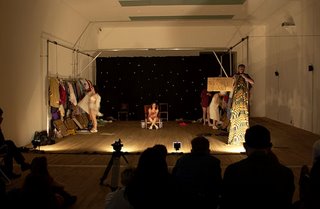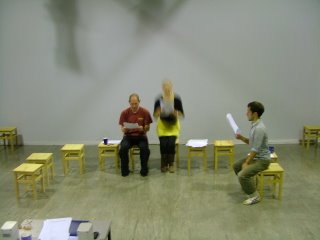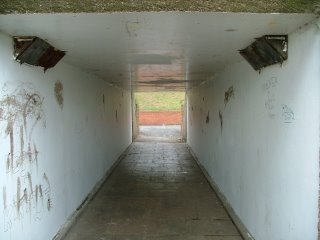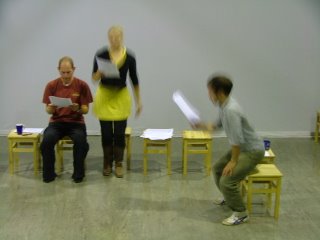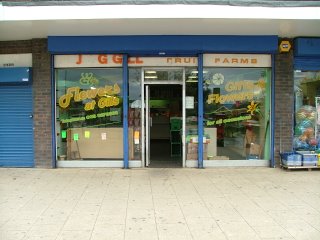
Always found it difficult to initiate the self-referential tone with the drama group. Reworked introduction to a meta-theatrical level. May not work but seems less incongruous than talking about line-learning during the fictional sections. May be better to separate fact from fiction, performers from characters. Also - on a topical note - the group are negotiating the purchase of a new stage but there are some issues over budget and whether they can afford it. Seems appropriate to include it in the text. I have written myself as the writer more into the story. The Drama Group play themselves. The setting is the church. The set is the stage.
Acts of Communion
MC Ladies and Gentlemen. The Church on Rise Park Drama Group present Acts of Communion. The setting - The Church Hall. The time – now. The Drama Group will be playing themselves.
FOB: Tony
BD 1: Donna
BM 1: Jonathan
BD 2: Louise
FOG: Ian
MOG: Audrey
MOB: Betty
GMOB: Kath
C: Harry
MC: Michael
MOB: Table for One was a success
MOG: Yes – good audience tonight
FOG: What happens now?
BD 1: We’re doing the other play
BD 2: The one that starts with us introducing ourselves
FOB The wedding
BM The Christening
GMOB The Funeral
C Sounds like a barrel of laughs
MC I’m a bit worried that it’s not very funny
MOG We can make it funny. We can make anything funny. We made a tragedy funny once.
FOG We’ve never done a tragedy since
C Now that’s a tragedy
FOB It’s always so difficult finding a play that fits
BD 1 It’s always so difficult finding a baby sitter
MOB One where we’ve all got a fair share of lines
BD 2 It’s not worth getting a baby sitter for a walk on part
GMOB That’s all I do – walk on and off.
[GMOB gets up and goes]
BM: What are you doing?
GMOB It says ‘Kath gets up and goes.’ See.
FOG I just have to sit here and look bored
C I haven’t got many lines in this one.
MC I can give you more
C Are you sure?
MC I just did.
FOB I’m not sure about my make up.
MOB It looks good. Old and tired. Just what it says in the script.
FOB I haven’t put any on yet.
MOG How’s my hair?
FOG Great. Where did you get the wig?
MOG: It’s not a wig
BD 1: How do I look?
BD 2: Awful. How do I look?
BD 1: Awful.
BD 1 / BD 2: We’re ready.
FOB / MOB: We’re ready
FOG / MOG: We’re ready
C: I’m ready
[GMOB returns]
GMOB: I’m back
BM 1: I’m having trouble doing up my tie.
[FOG helps BM tie tie]
FOG: That’s all right it says here I’m supposed to help you
BM 1: Thanks Dad
FOG: I’m not your Dad in this. I’m the groom’s dad.
BM 1: Where’s the Groom.
MC He’s not here. But you play him later.
MOB: Sounds very confusing.
FOB: Why can’t you write plays that people understand?
MC I’m trying
GMOB: I’m off again. [GMOB leaves]
C Isn’t it going to be difficult for the audience to follow?
MC No – we’re going to have more scenes like this.
BD 1: So what happens now
BD 2: We introduce ourselves
BM 1: We’ve already done that
FOG: No we introduce our characters
MOG: So who are playing now
MC The Drama Group will be playing themselves.
[GMOB returns]
GMOB: It's just like that show where I had to play six different characters except one of those characters is actually me.
BD 1: I get it
BD 2: I don’t
MOG: So where are we now?
MC: The church hall.
MOB: Whereabouts onstage?
MC: Well you’re pretending to be off stage but you’re actually onstage.
GMOB: I’ve been going off stage a lot recently. Why can’t I stay onstage.
C Because it’s a walk-on part.
MOB: Where’s the set?
MC We don’t need a set.
MOG: But why can’t we have one?
FOB: Because we’ve spent all our money on the stage.
FOG: So the stage is the set.
MC The play takes place in the church hall.
FOB: The church hall is the set.
GMOB: I have to go again [leaves]
C So what happens in the church hall.
FOG Weddings
BM Christenings
MOB Funerals
MC Plays
BM 1 We’ve got an audience.
BD 1 We’ve got a script
MC Has everybody learnt their lines
MOG: I don’t learn my lines until quite near the end.
MOB: I probably do a page at a time
[GMOB enters]
GMOB: If it’s a play where you’re on from start to finish I usually just tape it
[GMOB leaves]
FOB: I read the whole play through out loud in front of a tape recorder
FOG: I have a haphazard approach to learning lines.
BD 1: I read through it on my own for a while then I practise with my Dad
BM 1: Your real dad or your stage dad?
BD 1: I don’t have a stage dad
BM 1: Oh sorry.
BD 2: I’m rubbish at learning my lines. I don’t really look at the book.
BM 1: Just reading them will do. I never had too much of a problem
C: I don’t have any lines to learn
MC You just did
GMOB: [returns] I’m back again.
BD 2 We better get started then

